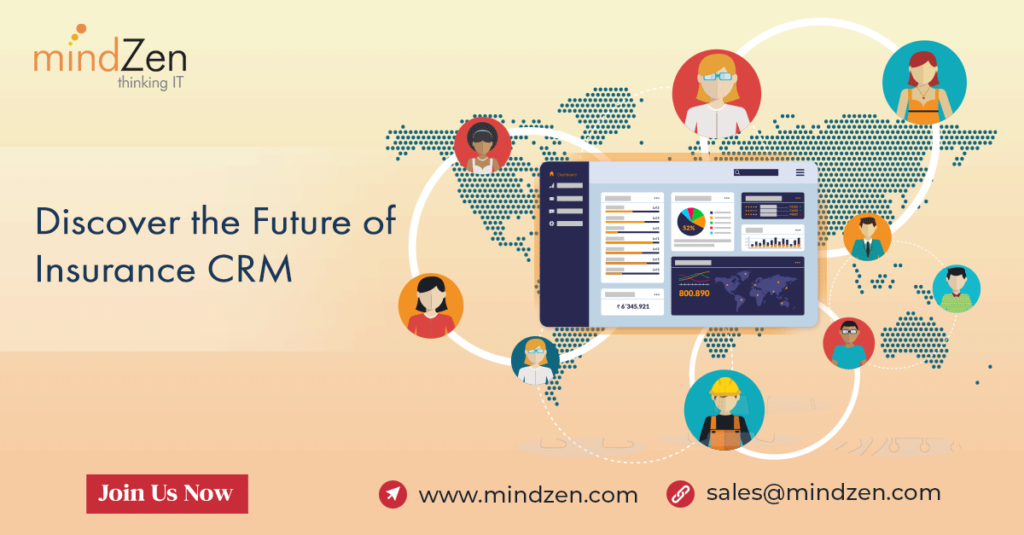Insurance CRM:
Customer Centricity and Personalized Engagement
The insurance industry, once characterized by static products and reactive service, is undergoing a seismic shift. Today’s customer demands a personalized experience, expecting real-time interactions, relevant recommendations, and proactive support. This evolution necessitates a move beyond traditional models, and that’s where Insurance Customer Relationship Management (CRM) steps in as a transformative tool for achieving true customer centricity and personalized engagement.

Why Customer Centricity Matters
Gone are the days when simply offering a good insurance product was enough. The rise of digital natives and fierce competition have fundamentally altered customer expectations. Tech-savvy customers expect seamless online interactions, personalized recommendations, and proactive customer service. Siloed approaches that compartmentalize customer data are no longer viable.
Benefits of a Customer-Centric Approach with Insurance CRM:
Embracing customer-centricity with an Insurance CRM unlocks a multitude of advantages:
- Deeper Customer Insights: An Insurance CRM centralizes all customer data, including policy information, communication history, preferences, and risk profiles. This holistic view lets you understand your customers deeper, anticipate their needs, and make data-driven decisions.
- Hyper-Personalized Communication: Leverage customer data to tailor communication across all touchpoints, from email campaigns to renewal reminders. Recommend relevant insurance products and services based on individual needs and risk profiles. Imagine sending personalized birthday offers for auto insurance discounts or suggesting home security add-ons to clients recently experiencing weather events.
- Proactive Customer Service: Identify potential issues before they become problems. Proactively contact customers with policy updates, claims guidance, or upcoming renewal reminders. This fosters trust and loyalty and demonstrates genuine care for their well-being.
- Improved Risk Management: Gaining insights into customer demographics and risk profiles allows for better risk selection and pricing strategies. This translates to a more balanced portfolio and increased profitability for your insurance business.
- Increased Customer Retention: Personalized engagement and proactive service cultivate stronger customer relationships. A CRM helps you identify and address potential churn triggers before they lead to lost clients. By demonstrating genuine care and responsiveness, you encourage customers to stay with you for the long term.
How an Insurance CRM Empowers Customer Centricity:
An Insurance CRM is not merely a data repository; it’s a powerful toolset for achieving customer centricity:
1. Automating Routine Tasks: Streamline routine tasks like policy renewals, claim processing, and document generation. This frees up your agents and allows them to dedicate more time to personalized interactions and building stronger customer relationships.
2. Multi-Channel Communication: Facilitate seamless communication through various channels your customers prefer – email, phone, SMS, live chat, or even social media integrations. This flexibility caters to diverse communication preferences and ensures customers can reach you when and where they need it.
3. Data-Driven Marketing: Design targeted marketing campaigns based on customer segments, preferences, and risk profiles. Leverage your CRM to identify cross-selling opportunities for relevant add-on insurance products while maximizing the reach and effectiveness of your marketing efforts.
4. Agent Empowerment: Equip your agents with real-time customer data and communication tools within the CRM interface. This empowers them to deliver exceptional service efficiently, allowing them to instantly access policy details, communication history, and customer preferences.
5. Performance Measurement and Analytics: Track key metrics like customer satisfaction (CSAT) scores, Net Promoter Scores (NPS), retention, and conversion rates. Analyze these metrics to identify areas for improvement and continuously optimize your customer-centric strategy. By measuring the outcomes of your efforts, you can refine your approach and ensure it’s delivering real value.
CRM and the Future of Insurance Customer Experience
The future of customer experience in the insurance industry is about meeting and exceeding expectations. Here’s how an Insurance CRM can be leveraged for advanced customer-centric strategies:
- Predictive Analytics: Leverage data insights from your CRM to predict customer needs and proactively offer solutions. This could involve suggesting risk mitigation strategies or anticipating policy changes based on life events like home ownership or new car purchases.
- Personalized Risk Management Tools: Integrate your CRM with telematics data (for auto insurance) or smart home technology data to offer personalized risk management tools. This fosters a more collaborative approach to risk mitigation and demonstrates a proactive commitment to customer safety and well-being.
- AI-Powered Chatbots: Utilize AI-powered chatbots to provide 24/7 customer support and answer basic inquiries efficiently. This allows for immediate resolution of simple issues while freeing agents to handle more complex situations.
The Final Word
Insurance companies can benefit by embracing a customer-centric approach empowered by an Insurance CRM. You’ll build stronger relationships with your customers, improve their experience, and drive business growth in the dynamic insurance industry.
Here are some additional points to consider:
- Compliance and Data Protection: Ensure your Insurance CRM adheres to all relevant data privacy regulations and implements robust security measures to protect sensitive customer information. Maintaining customer trust is paramount.
- Scalability and Integration: Choose an Insurance CRM that scales seamlessly as your business grows. To create a unified and streamlined workflow, look for solutions integrating existing systems like policy management software and marketing automation tools.
- User Adoption and Training: Investing in user adoption and training for your team is crucial. Equipping agents with the knowledge and skills to navigate the CRM effectively is essential for maximizing its potential and reaping the full benefits of a customer-centric approach.
Ready to find out more?
If you wish to know more about our Insurance Broker CRM Software solutions, don’t hesitate to contact us at sales@mindzen.com or visit our website, www.mindzen.com/Contact-us.
